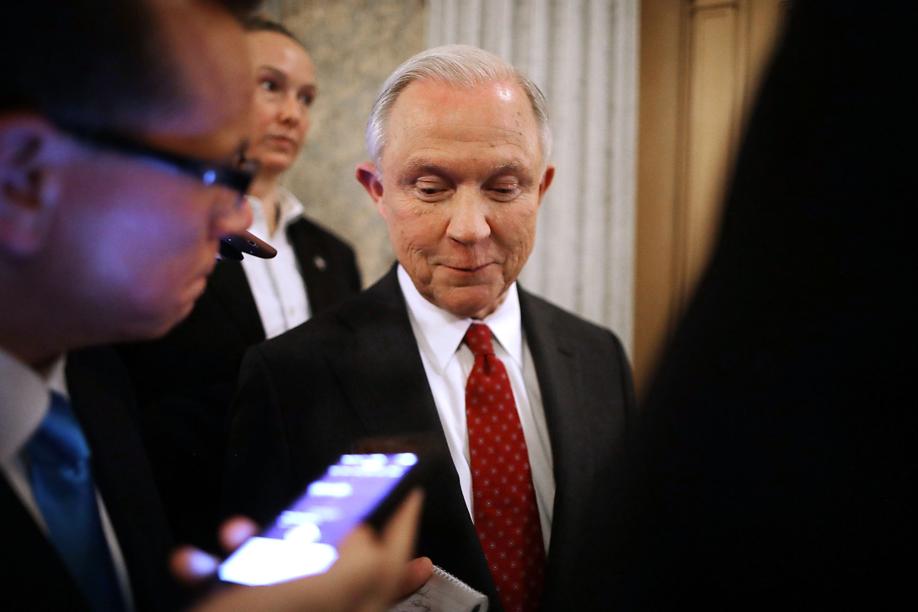
WASHINGTON — Senator Jeff Sessions was confirmed Wednesday as President Donald Trump’s attorney general, capping a bitter and racially charged nomination battle that crested with the procedural silencing of a leading Democrat, Senator Elizabeth Warren of Massachusetts, who had criticized the Alabama senator from the Senate floor.
Sessions survived a near-party-line vote, 52-47, the latest sign of the extreme partisanship at play as Trump strains to install his Cabinet. No Republicans broke ranks in their support of a colleague who will become the nation’s top law enforcement official after two decades in the Senate.
But the confirmation process — ferocious even by the moldering standards of decorum that have defined the body’s recent years — laid bare the Senate’s deep divisions at the outset of the Trump presidency. At the same time, the latest star turn for Warren rekindled the gender-infused politics that animated the presidential election and the women’s march protesting Trump the day after his inauguration last month.
Democrats spent the hours before the vote Wednesday seething over the treatment of Warren, who had been barred from speaking on the floor the previous night. Late Tuesday, Republicans voted to formally silence Warren after the senator read from a 1986 letter by Coretta Scott King that criticized Sessions for using “the awesome power of his office to chill the free exercise of the vote by black citizens’’ while serving as a US prosecutor in Alabama.
Since Trump announced his choice for attorney general, Sessions’ history with issues of race had assumed center stage. A committee hearing on his nomination included searing indictments from black Democratic lawmakers like Representative John Lewis of Georgia, the civil rights icon, and Senator Cory Booker of New Jersey, who broke with Senate tradition to testify against a peer.
For weeks, Republicans have rejected any suggestion that Sessions cannot be trusted on civil rights, arguing that he had been tarnished unfairly over accusations of racial insensitivity that have dogged him since the 1980s.
“Everybody in this body knows Senator Sessions well, knows that he is a man of integrity, a man of principle,’’ Senator Dan Sullivan, an Alaska Republican, said during the debate on Wednesday afternoon. The “twisting’’ of Sessions’ record offended him, he said, even as Democrats continued their attacks on the nominee.
As the 84th attorney general, Sessions brings a sharply conservative bent to the Justice Department and its 113,000 employees. A former prosecutor, he promises a focus aligned with Trump in pushing a “law and order’’ agenda that includes tougher enforcement of laws on immigration, drugs, and gun trafficking.
Civil rights advocates worry, however, that he will reverse steps taken by the Obama administration in the last eight years to bring more accountability to police departments, state and local governments, and employers. Advocates point to his history of votes against various civil rights measures, as well as the accusations of racial insensitivity.
Senator Patty Murray, a Washington Democrat, said Wednesday that on civil rights, immigration, abortion, criminal sentencing guidelines, and a range of other issues, Sessions had been far outside the mainstream and had pushed “extreme policies’’ often targeting minorities.
The vote on Sessions came a day after Senate Republicans broke through a bottleneck in Trump’s nominees by approving Betsy DeVos, the embattled Republican donor, as education secretary with the help of a tiebreaking vote by Vice President Mike Pence. With Sessions’ confirmation, votes are expected in coming days on the nominations of Representative Tom Price of Georgia as secretary of health and human services, and Steven T. Mnuchin as Treasury secretary.
Sessions’s path to confirmation hit another snag that riled Democrats and energized opponents of his nomination: Trump’s dramatic firing of the acting attorney general.
Last week, Trump’s abruptly dismissed Sally Q. Yates, the acting attorney general, setting off a fierce backlash from Democrats against Sessions’s nomination to fill her job on a permanent basis. Yates, a holdover from the Obama administration, was fired for refusing to defend Trump’s controversial order barring travel by some foreigners, which is now tied up in litigation in federal courts. Democrats seized on her firing to say that Sessions is too close to the president to be independent or stand up to him.
As the first senator to support Trump’s long-shot bid for president last year, Sessions became an influential campaign adviser. While he pledged repeatedly not to be “a mere rubber stamp’’ for the White House, Democrats asserted that he would not be willing to challenge legally questionable policies.


 PREVIOUS ARTICLE
PREVIOUS ARTICLE